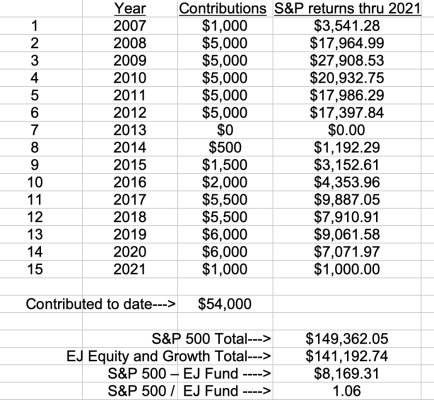ducky911
Recycles dryer sheets
- Joined
- May 18, 2010
- Messages
- 497
2007 - $1,000.
2008, 2009, 2010, 2011 and 2012 - $5,000 each year.
2013 - $0.
2014 - $500.
2015 - $1,500.
2016 - $2,000.
2017 and 2018 - $5,500 each year.
2019 and 2020 - $6,000 each year.
Thus far, I have contributed $1,000 toward my 2021 contributions.
that is $140,354.00
And you would have had to pay some taxes along the way that would lower that number. My gut says it should have been much higher than E jones....How risky have they been? maybe I made a math error?

